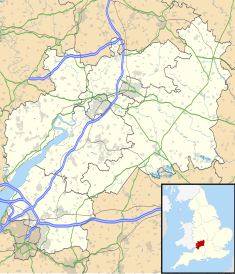Ampney Park is a 16th-century manor house at Ampney Crucis, Cotswolds, in Gloucestershire, England. It is a Grade II-listed building.[1]
| Ampney Park | |
|---|---|
 Entrance to Ampney Park | |
| Location | Ampney Crucis, Gloucestershire, England |
| Coordinates | 51°43′00″N 1°54′53″W / 51.7168°N 1.9148°W |
| Built | Late 16th century |
Listed Building – Grade II | |
| Official name | Ampney Park |
| Designated | 4 June 1952[1] |
| Reference no. | 1090018 |
Listed Building – Grade II | |
| Official name | The Lodge, Ampney Park |
| Designated | 4 June 1952[2] |
| Reference no. | 1305297 |
History
editThe estate is attached to the Church of the Holy Rood and lies on Ampney Brook within the area known as the Cotswold Water Park.
The house was built in the late 16th century by John Pleydell. Additions and extensions to the house were carried out in the 18th and 19th centuries.[1] The lodge was built in the mid-17th century and the rear wing was added in 1893.[2] It is now a collection of Jacobean, Georgian and Victorian architecture.[3]
In 1724, the house passed into the family of Viscount Downe of Cowick Hall in Yorkshire. They sold it to Samuel Blackwell in 1765,[4] and his family owned it until 1891.[5][3] The house was next owned by the Cripps family until 1959, having been bought by Edmund Cripps in the 1890s.[5] Edmund Cripps extended the house including the addition of a billiard room with stained-glass windows depicting the arms of the Cripps, Radcliffe and Brydges families.[6] In the 1960s, the house was used as accommodation for students from the agricultural college in Cirencester (now the Royal Agricultural University) and subsequently redeveloped.[3][7]
It was a private house until it was turned into a hotel in 1982, before returning to private use.[8] In 1997, the house and estate were bought by businessman Edward Scott and his wife.[3]
Architecture
editThe stone building has stone slate roofs. The original two-storey block has attic rooms beneath the cornice. The interior includes rooms with oak panels, moulded plaster ceilings and stone fireplaces.[1] The house includes nine bedrooms a gym and an indoor swimming pool.[9]
The 25.5 acres (10.3 ha)[9] grounds were laid out with terracing near the house and the parterre and croquet lawn.[6] There are multiple sculptures.[3] It also has a lake and water gardens.[8] There is also a tennis court.[10] Outbuildings have been converted into a riding school,[9] including seven loose boxes and a sand school.[5]
References
edit- ^ a b c d "Ampney Park". National Heritage List for England. Historic England. Archived from the original on 17 June 2020. Retrieved 30 June 2020.
- ^ a b "The Lodge, Ampney Park". National Heritage List for England. Historic England. Archived from the original on 17 June 2020. Retrieved 30 June 2020.
- ^ a b c d e Doughty, Eleanor (28 May 2018). "Yours for £9.5 million: Ampney Park, a mishmash of Jacobean, Georgian and Victorian splendour". The Telegraph. Archived from the original on 15 August 2018. Retrieved 30 June 2020.
- ^ Brooke, John. "BLACKWELL, Samuel (d.1785), of Williamstrip Park and Ampney Crucis, Glos". History of Parliament. The History of Parliament Trust. Archived from the original on 16 December 2019. Retrieved 30 June 2020.
- ^ a b c Lemieux, Hannah (19 January 2020). "A jaw-dropping Cotswold manor with indoor AND outdoor arenas, set within perfect hacking countryside". Horse and Hound. Archived from the original on 18 April 2020. Retrieved 30 June 2020.
- ^ a b "Ampney Park" (PDF). Savills. Retrieved 30 June 2020.
- ^ Walker, James. "Historic Grade II Listed Cotswold Country House set within Magnificent Grounds close to Cirencester". Savills. Archived from the original on 7 June 2020. Retrieved 30 June 2020.
- ^ a b "Ampney Park". Parks & Gardens. The Hestercombe Gardens Trust. Retrieved 30 June 2020.
- ^ a b c "On the Market: Grade II-Listed Manor with One of the Finest 17th Century Interiors in Britain". Property Curator. Archived from the original on 1 July 2020. Retrieved 30 June 2020.
- ^ Churchill, Penny (9 May 2018). "An idyllic country home with a breathtaking 17th century interior, plus pool, stables and an indoor arena". Country Life. Archived from the original on 12 June 2018. Retrieved 30 June 2020.
